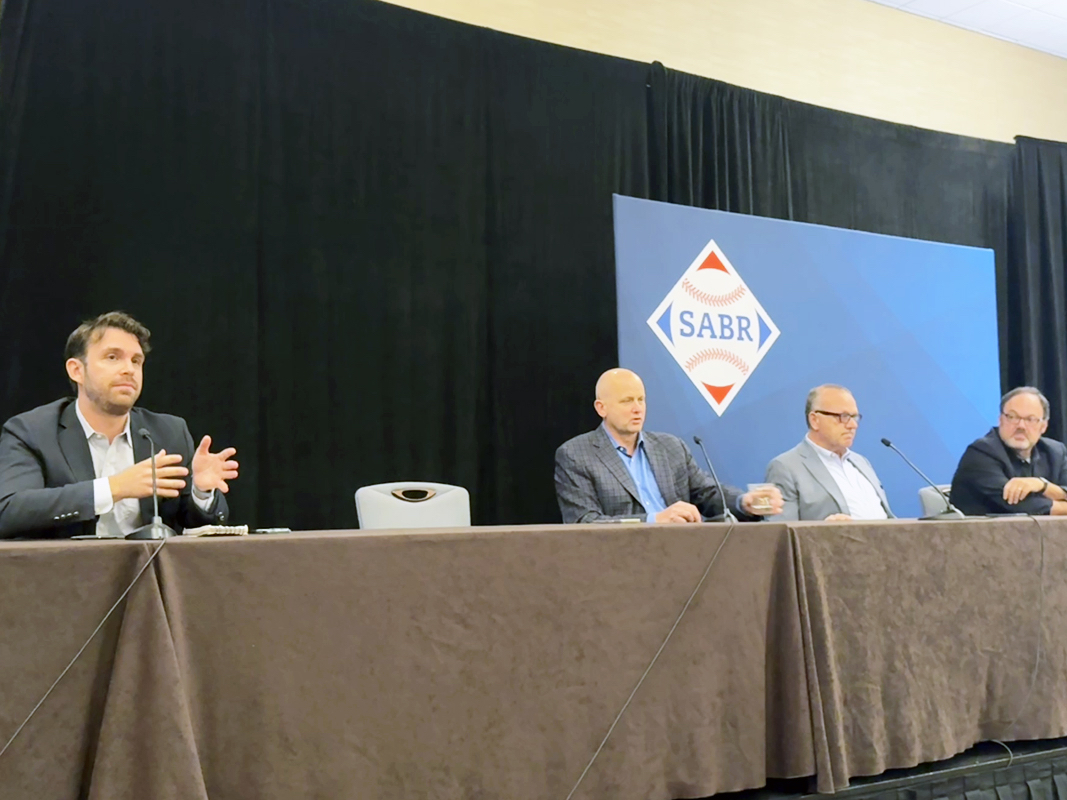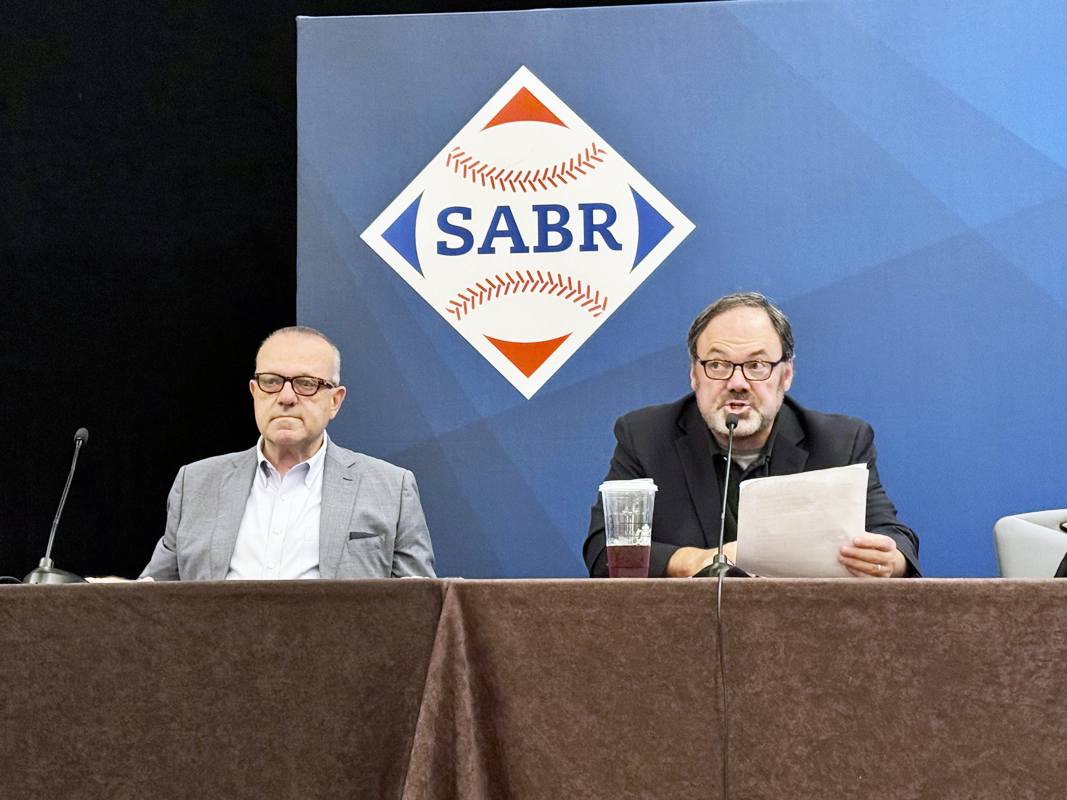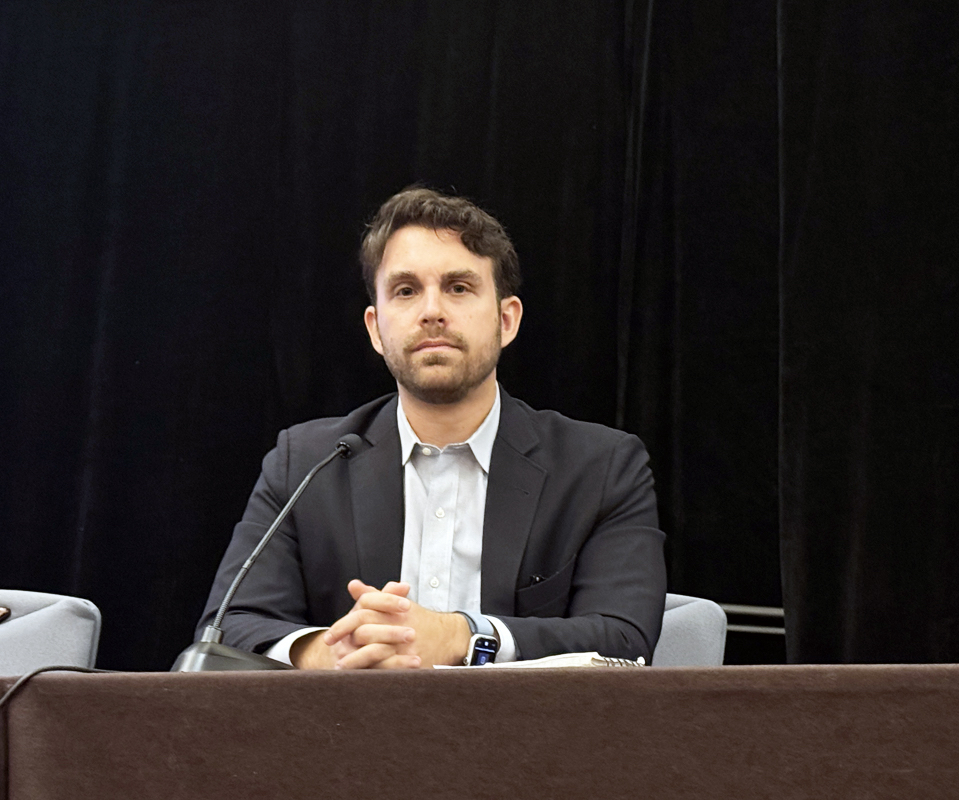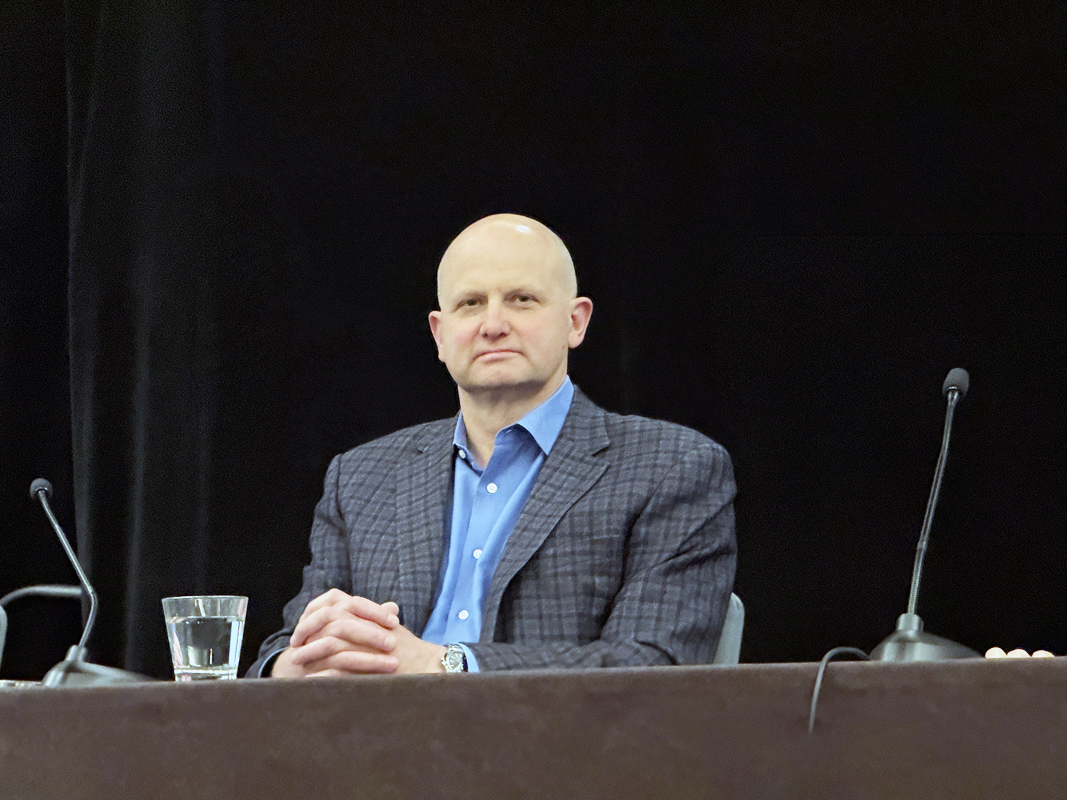SABR 52: Listen to highlights from the Future of Baseball Broadcasts Panel with Dave St. Peter, Evan Drellich, Rob Hubbard, Adam Platt
On Saturday, August 10, 2024, the SABR 52 Future of Baseball Broadcasts Panel was held at the Hyatt Regency Minneapolis. The panel, moderated by Adam Platt, Executive Editor of Twin Cities Business magazine, also included Dave St. Peter, President/CEO of the Minnesota Twins; Evan Drellich of The Athletic; and Rob Hubbard, President/CEO of Hubbard Television Group.
St. Peter is President and Chief Executive Officer of the Minnesota Twins. This year is his 35th season with the Twins organization; he was named the fourth president in Twins history in 2002 and added the CEO title in 2016. He played a central role in the approval, design, and construction of Target Field, which opened in 2010 and has hosted the MLB All-Star Game, NHL Winter Classic, and many other major events. During his tenure as team president, the Twins have won nine American League Central Division titles and have twice been named Organization of the Year by Baseball America.
Drellich is a senior writer for The Athletic where he covers the business of baseball. He is the author of Winning Fixes Everything: How Baseball’s Brightest Minds Created Sports’ Biggest Mess. He previously covered baseball at the Houston Chronicle, Boston Herald, MassLive, NBC Sports Boston, and MLB.com.
Hubbard is President and Chief Executive Officer of Hubbard Television Group and Vice President of Hubbard Broadcasting, Inc. He is among the third generation of broadcasters at Hubbard Broadcasting, which owns and operates more than 50 media stations from Minnesota to Florida, including KSTP TV and radio in the Twin Cities. He will be inducted into the Minnesota Broadcasters Hall of Fame in the fall of 2024, along with his siblings Stan, Ginny, and Kari.
Platt is Executive Editor at Twin Cities Business magazine, a position he has held since 2011. He attended Macalester College in St. Paul and previously worked as a writer and editor at the Twin Cities Reader, Casino Executive, and Mpls.St.Paul magazine.
- AUDIO: Listen to highlights from the SABR 52 Future of Baseball Broadcasts Panel (1:25:24; MP3)
Here are some highlights:
ON THE TWINS’ RADIO CONTRACT EXPIRING AT THE END OF THE 2024 SEASON
- St. Peter: “Radio is still an important part of our business. It’s an important part of the way we showcase our brand. It’s still a revenue-generating part of our business. It’s still destination programming for a lot of fans throughout the upper Midwest. We will not proceed with a radio partnership that doesn’t have some level of definition on where you could find the games, so to speak. … A lot of basketball and hockey teams, radio is a loss leader. In baseball, it is a revenue driver. We feel like we’ve got really good options to consider. We’re hoping to make a decision here over the next couple of months.”
ON THE EFFECT OF TV CONTRACTS ON THE TWINS’ PAYROLL
- St. Peter: “We’ve been unable to stream Twins baseball in this market, but we have to fix that. I can assure you that if you look to 2025, we will be looking to do that with a partner that can help that. The good news is we have options. … We look to find a way to, yes, monetize it, but to do it in a way that delivers the product to more fans. That is clearly the goal. … We also, frankly, had been operating with payrolls that were not in line with where our revenues have been, television aside. That’s just a reality. I understand that comes with frustration if you’re a fan. We felt strongly at the time that we had a really good team coming back, and an opportunity to not just win our division, but do some damage in the postseason. We’ll see how it plays out.”
ON SMALL-MARKET TEAMS AND THE FUTURE OF TV DEALS
- Drellich: “Those concerns have always existed; they are probably exacerbated today. The hurdles to change are really significant. On the club side, owners have always wanted a salary cap. They can push for it again. … But that would take a long fight. You need unity amongst your owners. The first thing for the clubs to figure out is their own strategy. Yes, the small markets aren’t happy. There’s an Economic Reform Committee that’s been formed and some owners are on this, and they’re working on what they want to do with those cable rights. It’s the omnipresent topic in baseball: small markets vs. large markets. … We had a lockout a few years ago. That was predicated on the players were unhappy on about 10 years. The next one is going to be predicated on TV. This is why TV is important: it’s going to affect everything.”
ON THE DIAMOND SPORTS GROUP DEAL WITH COMCAST
- Drellich: “I think the impact of the Comcast-Diamond deal is bigger than people realize. It’s not just about fans in Minnesota and these other markets getting their games back right away. If Diamond cannot come out of bankruptcy, just in baseball alone there are 12 teams that are going to have their rights free for next year. And that would reshape the landscape in a very big way. The commissioner has talked about this, about potentially launching a national package of half the teams, where you would be able to stream in-market. Most people here know about MLB.TV, but that’s out of market. Here in Minneapolis, you cannot get Twins games. This would be in market. … Whether Diamond can emerge … is going to have a real trickle-down effect on the evolution of broadcasting in the sport.”
ON THE EMERGENCE OF AMAZON AS A BASEBALL BROADCASTER
- Hubbard: “Amazon doesn’t care about any market and they’ve shown that in how they pick their programming. They don’t do anything locally. What they want to do is to disrupt the viewing as it is. They want to disrupt the network system, because that enables a hole for them to step into. We don’t know what drives them, we don’t know the economics. But we do know in NFL football, there’s no possibility they’re making money on that package but they’re still happy to do it. … What I do believe … in the long run, when you put your hands into a company that has that viewpoint, everyone is going to lose. Even if in the short term, there’s a short-term win in terms of economics.”
For more coverage of SABR 52, visit SABR.org/convention.
Originally published: August 19, 2024. Last Updated: August 20, 2024.






